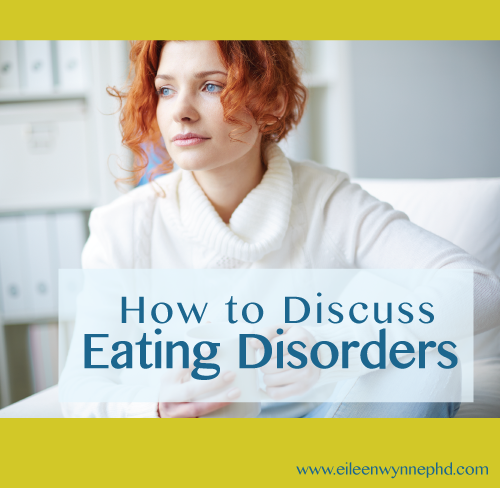How to Discuss Eating Disorders
In my last blog post, we looked at the signs of an eating disorder. This week I am going to discuss what you can do if you believe that a friend has an eating disorder.
A few points to remember:
in 86% of people who have eating disorders, the disorder has been established by the age of 20 for adolescents, anorexia is the third most common chronic illness
a quarter of college-aged women employ binging & purging as a method of weight management
more than 1/2 of teenage girls about 1/3 of teenage boys use unhealthy weight control behaviors including: fasting and skipping meals, smoking cigarettes, vomiting, and taking laxatives.
Eating disorders are a real and prevalent concern among adolescents and emerging adults and we should be aware and vigilant. When you observe the kinds of behaviors that indicate an eating disorder, it can be extremely difficult to have a frank conversation, even with a very close friend. So what should you do if you observe an eating disorder in someone you care about?
How you can help
A good first step, it so try to bring the topic up with your friend in private. Explain what you have observed and why you are concerned. Try to listen and be supportive in the most non-judgemental manner possible.
If your friend is willing to discuss the eating disorder, discuss ways that they can become healthy again. Avoid blame-based statements such as, “you could get well if you’d only eat” or “all you have to do to start getting better is work out less”. Try to engage them by finding out how you can help and be supportive.
Learn about eating disorders. There are lots of online sources from reputable organizations such as NEDA (National eating Disorders Association) and (NIMH) National Institute of Mental Health. The more you know, the better equipped you will be to share what you know with your friend as you determine that they are ready to hear.
Don’t hover over your friend or monitor every bite of food they eat. Eating disorders are complicated and if you become too overbearing, your friend may simply pull away.
Remember that “fixing” your friend is not your job! Know your own limitations. At some point it may become necessary to get parents or a professional involved. You can call a hotline or talk with a counselor about next steps.
Try to get your friend to join a support group or speak with a professional, you may even go as far as to offer to accompany them.
Eating disorders are very challenging for everyone involved. It is hard to discuss them and even harder to watch someone you care for struggle with one. If you are in this situation, be as supportive as possible while also being aware that you may need to get a professional to help your friend.
Sincerely,
Dr. Eileen Wynne
References
http://kidshealth.org/teen/food_fitness/problems/friend_eating_disorder.html
http://www.helpguide.org/articles/eating-disorders/helping-someone-with-an-eating-disorder.htm
http://www.anad.org/get-information/about-eating-disorders/eating-disorders-statistics/

